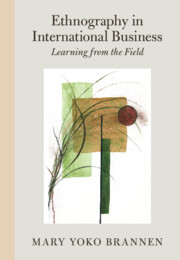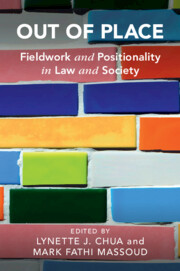Refine search
Actions for selected content:
82 results
One - Anthropological Engagements
-
- Book:
- Marriage and the Moral Imagination
- Published online:
- 12 December 2025
- Print publication:
- 22 January 2026, pp 29-53
-
- Chapter
- Export citation
7 - Case Study Two
- from Part IV - Chinese Mediation in Action
-
- Book:
- The Mediation System of China from an Interdisciplinary Perspective
- Published online:
- 23 October 2025
- Print publication:
- 06 November 2025, pp 209-240
-
- Chapter
- Export citation
2 - History and Foundations of Geomorphology
-
-
- Book:
- Essentials of Geomorphology
- Published online:
- 12 November 2025
- Print publication:
- 23 October 2025, pp 9-22
-
- Chapter
- Export citation

Ethnography in International Business
- Learning from the Field
-
- Published online:
- 21 October 2025
- Print publication:
- 09 October 2025
SILCHESTER INSULA ix: THE EXCAVATIONS IN PERSPECTIVE
-
- Journal:
- The Antiquaries Journal , First View
- Published online by Cambridge University Press:
- 16 October 2025, pp. 1-14
-
- Article
-
- You have access
- Open access
- HTML
- Export citation
Part I - Intracultural Ethnography
-
- Book:
- Ethnography in International Business
- Published online:
- 21 October 2025
- Print publication:
- 09 October 2025, pp 27-124
-
- Chapter
- Export citation
3 - Unmasking China’s Illegal Markets
-
- Book:
- Extralegal Governance
- Published online:
- 21 November 2025
- Print publication:
- 25 September 2025, pp 42-58
-
- Chapter
- Export citation
2 - Data Collection
-
- Book:
- Analysing Sociolinguistic Variation
- Published online:
- 19 June 2025
- Print publication:
- 03 July 2025, pp 16-33
-
- Chapter
- Export citation
Confronting Archaeology’s “Gray Zones”
-
- Journal:
- American Antiquity / Volume 90 / Issue 3 / July 2025
- Published online by Cambridge University Press:
- 09 September 2025, pp. 555-572
- Print publication:
- July 2025
-
- Article
-
- You have access
- Open access
- HTML
- Export citation
4 - Probing the Financial Statecraft of Borrowers through Comparative Cases
-
- Book:
- The Financial Statecraft of Borrowers
- Published online:
- 12 December 2024
- Print publication:
- 19 December 2024, pp 136-158
-
- Chapter
- Export citation
One - Fieldwork beyond Fieldwork
-
- Book:
- ‘Unruly’ Children
- Published online:
- 31 October 2024
- Print publication:
- 14 November 2024, pp 36-71
-
- Chapter
- Export citation
7 - The Imperial Logic of American Bioethics
- from Part II - Institutional Encounters, Discipline, and Settler Colonial Logics
-
-
- Book:
- Empire, Colonialism, and the Human Sciences
- Published online:
- 24 October 2024
- Print publication:
- 07 November 2024, pp 176-208
-
- Chapter
-
- You have access
- Open access
- HTML
- Export citation
“Like Us, but Not Quite Us”: Researching Gender Politics in Autocratic Contexts
-
- Journal:
- Perspectives on Politics / Volume 23 / Issue 2 / June 2025
- Published online by Cambridge University Press:
- 31 October 2024, pp. 705-716
- Print publication:
- June 2025
-
- Article
-
- You have access
- Open access
- HTML
- Export citation
5 - The Fieldwork and Its Findings
-
- Book:
- Improving Procedural Justice in Anti-Dumping Investigations
- Published online:
- 09 May 2024
- Print publication:
- 16 May 2024, pp 153-190
-
- Chapter
- Export citation

Out of Place
- Fieldwork and Positionality in Law and Society
-
- Published online:
- 11 March 2024
- Print publication:
- 22 February 2024
-
- Book
-
- You have access
- Open access
- Export citation
Chapter Seven - At Odds with Everything around Me
-
-
- Book:
- Out of Place
- Published online:
- 11 March 2024
- Print publication:
- 22 February 2024, pp 139-159
-
- Chapter
-
- You have access
- Open access
- HTML
- Export citation
Chapter Five - Feeling at Home Outside
-
-
- Book:
- Out of Place
- Published online:
- 11 March 2024
- Print publication:
- 22 February 2024, pp 103-118
-
- Chapter
-
- You have access
- Open access
- HTML
- Export citation
Chapter Two - Research as Accompaniment
-
-
- Book:
- Out of Place
- Published online:
- 11 March 2024
- Print publication:
- 22 February 2024, pp 36-56
-
- Chapter
-
- You have access
- Open access
- HTML
- Export citation
Preface
-
- Book:
- Out of Place
- Published online:
- 11 March 2024
- Print publication:
- 22 February 2024, pp xiii-xvi
-
- Chapter
-
- You have access
- Open access
- HTML
- Export citation
Chapter Four - Out of Place when Studying China’s Sex Industry
-
-
- Book:
- Out of Place
- Published online:
- 11 March 2024
- Print publication:
- 22 February 2024, pp 84-102
-
- Chapter
-
- You have access
- Open access
- HTML
- Export citation
